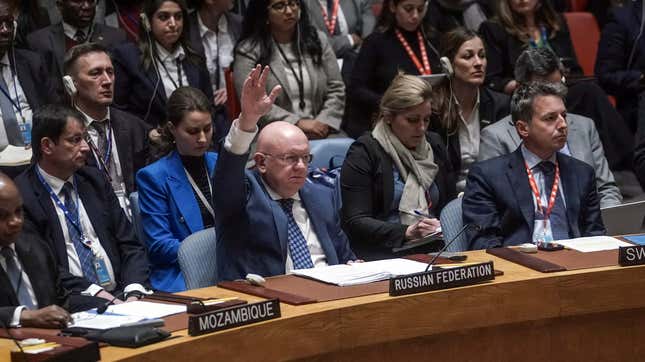Russia’s UN Veto Fuels More Tension With the US Over Nuclear Weapons in Space

Russia’s UN Veto Fuels More Tension With the US Over Nuclear Weapons in Space (Image Credit: Gizmodo-com)

This week, Russia unsurprisingly vetoed a draft resolution to prevent the placement of nuclear weapons in orbit. Russia’s rejection of the United Nations resolution is not a clear indication that it possesses orbital arsenal that could destroy satellite constellations, but it shows the country is not wavering under U.S. pressure to give up on developing its anti-satellite weapons.
Russia was the only one to vote against the U.N. security council resolution, which was sponsored by the U.S. and Japan. Thirteen other members of the security council voted in favor of the resolution, while China abstained, Reuters reported. Being a permanent member of the security council, Russia’s veto prevented the resolution from being adopted.
Related Content
The resolution would have called for prohibiting the deployment of nuclear weapons, or other weapons of mass destruction, in space. The draft is in compliance with the 1967 Outer Space Treaty, which was signed by the U.S. and Russia, preventing nuclear weapons being placed in space or on celestial bodies. In the draft resolution, the U.S. and Japan called for countries “to contribute actively to the objective of the peaceful use of outer space and of the prevention of an arms race in outer space.”
In response to Russia’s rejection of the U.N. resolution, National Security Advisor Jake Sullivan issued a statement that read, “As we have noted previously, the United States assesses that Russia is developing a new satellite carrying a nuclear device. We have heard President Putin say publicly that Russia has no intention of deploying nuclear weapons in space. If that were the case, Russia would not have vetoed this resolution.”
In February, the White House confirmed intelligence reports suggesting that Russia is developing nuclear anti-satellite weapons. Russia denied the allegations, but it does have a history of dabbling in anti-satellite weapons (as does the U.S. for that matter). In November 2021, Russia destroyed a defunct Soviet-era satellite in low Earth orbit as part of an anti-satellite test, producing thousands of pieces of debris. The newly introduced space junk forced astronauts and cosmonauts aboard the International Space Station to seek shelter as shards of the blown-up satellite threatened the orbital lab.
In response, the U.S. adopted a self-imposed ban on the ASAT tests in April 2022 and then encouraged other nations to follow suit. In December 2022, 155 countries voted in favor of a U.N. resolution against anti-satellite tests, while nine voted against it, including Russia, China, Cuba, Syria, and Iran.
In its rejection of the recent U.N. resolution, Russia claimed that the U.S. and Japan did not go far enough to ban all weapons in space. To that effect, Russia and China introduced an amendment to the resolution that would ban “any weapons in outer space” and threats “or use of force against outer space objects,” according to Reuters.
The amendment was rejected, but it did receive support from seven members of the security council. “Without our amendment, based on the General Assembly resolution adopted in December 2023, the text tabled by the U.S. will be unbalanced, harmful and politicized,” Deputy Russian U.N. Ambassador Dmitry Polyanskiy is quoted in Reuters as saying.
Russia and China have been calling for a ban on all weapons in space for years, proposing their own resolution in 2008. Other countries, including the U.S., opposed the suggestion, mainly because it doesn’t include provisions on ground-based anti-satellite missiles.
The resolution, though it didn’t pass, did solidify ongoing space alliances. The U.S. is clearly strengthening its ties with Japan in space, recently announcing that the Artemis program would land a Japanese astronaut on the Moon. Russia and China, on the other hand, are also in alliance with their own plans to land on the Moon.
China is advancing its lunar program with aims to rival NASA’s Artemis program, including plans for a permanent base on the Moon’s surface. The International Lunar Research Station Moon base was announced as a joint project between China and Russia in 2021, and other countries such as the United Arab Emirates and Pakistan later joined in on the project. Russia’s own space program is falling behind, and the country doesn’t bring much to its alliance with China. The Russian mission to the Moon Luna-25 crashed on the lunar surface in August 2023, while China’s series of lunar missions has been highly successful.
Lines have certainly been drawn in the orbital sands, but whether that would lead to a full-on space war is yet to be determined.
For more spaceflight in your life, follow us on X and bookmark Gizmodo’s dedicated Spaceflight page.








